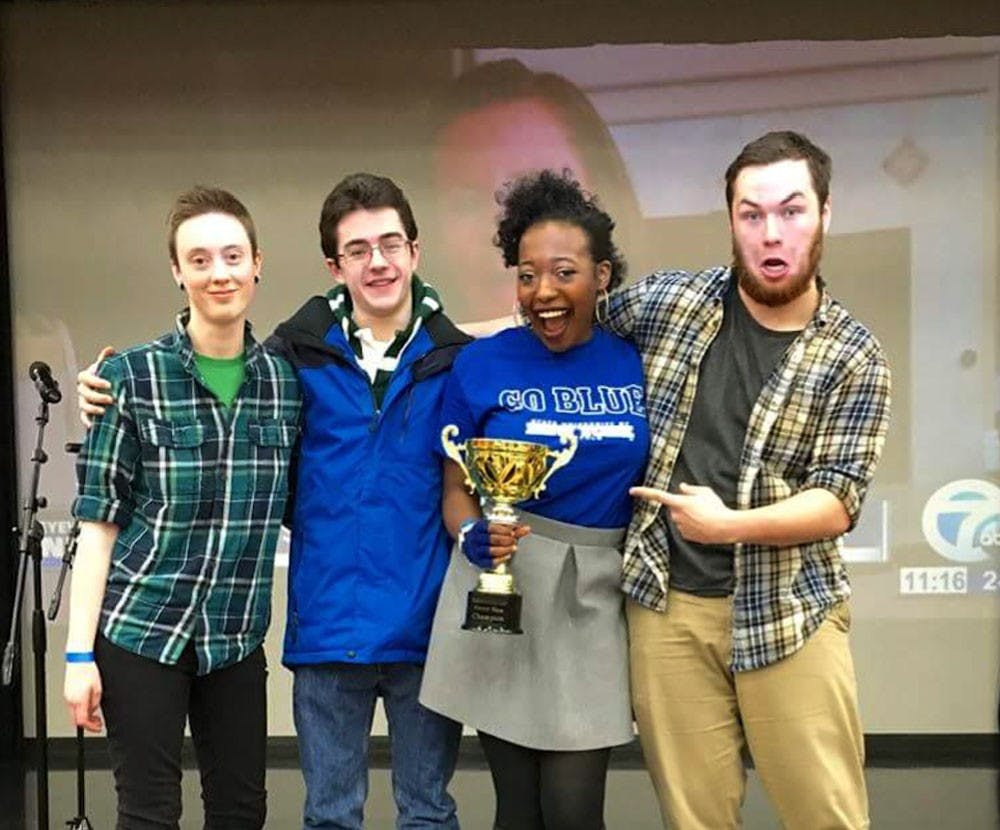Connor Mack is a senior aerospace engineering major, but he doesn’t spend his free time building model bridges out of balsa wood or solving Rubik’s cubes, unlike what some may expect from him.
Mack spends his free time writing poems, which he performs at UB Speaks.
“People think it’s weird until they hear it,” Mack said. “The stereotype for engineers doesn’t include writing poems.”
UB Speaks is a poetry club that meets every other Sunday in Baldy 110 at 3 p.m. The meetings are workshops where writers come and express their thoughts about different topics.
Mack said he enjoys writing poems because it allows him to be creative, which is something he doesn’t get to do often as an engineering student. UB Speaks gives him an outlet to explore this creativity.
“We welcome all kinds of poetry or just poetry lovers,” said Tom Dreitlein, a junior communication and English major who is also the secretary and workshop coordinator of the club. “You don’t have to write poetry to appreciate it.”
The workshops are geared toward those who want to create poetry, but even those who don’t write poetry might be able to find a place in this club.
For those who are interested in performing, UB Speaks also offers a poetry slam performance group.
“The general label that is now applied to slam poetry is basically performance poetry,” Mack said. “What makes that different from normal poetry is you use your body and the way you’re speaking to amplify your words. Performance pieces are generally a little more raw and a little more emotional [than conventional written poetry].”
UB Speaks recently went to a slam competition at SUNY Buffalo State on Feb. 26. They competed with students from the Rochester Institute of Technology, Buffalo State and SUNY Fredonia in front of a crowd of about 300 and took home first place.
Unlike some competitions where the judges are predetermined experts, the judges for slam competitions are random members of the audience.
“They might have never been to a poetry slam before, they might have never read a poem, it doesn’t matter,” Dreitlein said. “That’s kind of the beauty of poetry slam. They score from zero to 10 with points. And then the highest and lowest score are dropped. The highest score a team could get, which is unheard of, is 140.”
Danielle Johnson, a sophomore theater and performance major and president of UB Speaks, explained that each slam team is allowed four performance slots. Those slots last three minutes each with a grace period of 10 seconds and can be filled by either individual or solo performances. The judges in the audience grade each performance separately.
Judges are supposed to be impartial but that doesn’t always happen.
“We went to a slam and my cousin was [picked to be] a judge and she judged everyone badly except me, but didn’t understand she was judging my team badly,” Johnson said.
Regardless of how slam competitions are scored, some might think getting up in front of a group of people to perform a poem might be an easier thing to do than performing a speech or acting. But Johnson, who has spent most of her life in front of other people through her theater career, disagrees.
“Theater – it’s my heart but it’s not my soul,” Johnson said. “When I go up there and I do poetry, I wrote that poem. And most of my poems are about situations that I’ve been in, that I care about, you know. So you’re putting your heart out on the poem. With slam poetry you’re getting judged – literally.”
Not everyone who participates in UB Speaks has to participate in the slam competitions. Whether it’s slam poetry or a different form, UB Speaks offers students an opportunity to learn more about the art and practice their skills.
John Jacobs is the assistant features editor and can be reached at john.jacobs@ubspectrum.com





